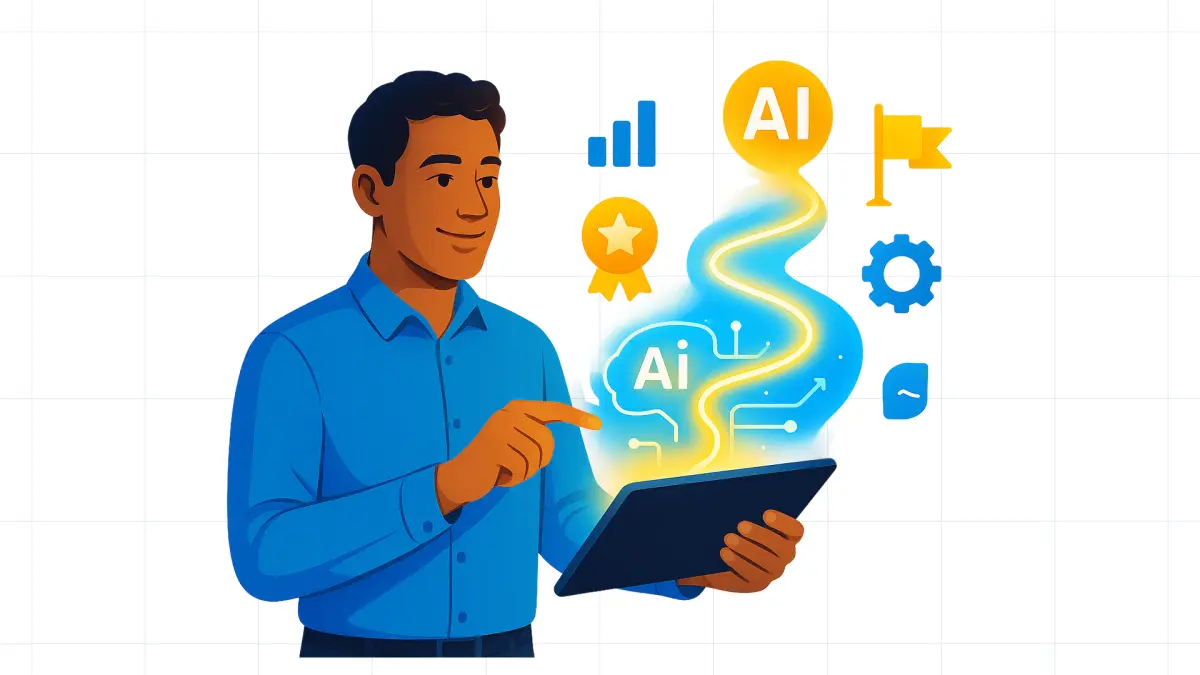How AI Will Transform Career Development
What if career growth wasn’t top-down but personalized, predictive, and continuous? AI is making that a reality.

Career development within organizations has always required balance.
Leaders aim to match talent with business needs, while employees look for growth that feels personal and meaningful.
In the past, tools such as career ladders, annual reviews, and standard training programs were rarely updated.
Now, AI is shifting this approach.
Career development is becoming increasingly dynamic, employee-driven, and data-driven.
AI in HR Today
with Anthony Onesto
Subscribe for exclusive insights from Anthony Onesto, Chief People Officer at Suzy, and learn how AI is reshaping HR, enhancing employee engagement, and driving business success.
TOGETHER WITH
From One-Size-Fits-All to Hyper-Personalized Growth
Previously, learning and development programs often used a one-size-fits-all method.
With AI, that approach is becoming outdated.
Now, employees can access learning content that matches their roles, skills, and career goals.
AI systems review performance data, suggest courses, and offer real-time coaching through chatbots and digital mentors.
This shift means employees receive training that is more relevant and effective.
Rather than investing in broad programs where most content may not be applicable, companies can focus on targeted development that boosts productivity and helps retain employees.
Real-Time Feedback and Career Navigation
AI accelerates the frequency of employee feedback.
Instead of waiting for quarterly reviews, employees now receive ongoing insights about their performance, skills, and career direction.
This steady feedback helps them make quick adjustments and grow as they work.
One of the most critical changes is how AI acts as a career guide.
These platforms can showcase new opportunities within the company to employees based on their skills and goals.
Employees can find lateral moves, challenging projects, or new roles that fit their ambitions.
Career mobility is now clear and supported by data, giving employees more control over their paths.
Predicting and Closing Future Skill Gaps
The future of work requires new skills at a faster pace than traditional career models can keep up with.
AI can predict where skill gaps will emerge by analyzing business trends and industry data, both internally within your company and externally within your industry.
For example, a company could anticipate months in advance that it needs more data or sustainability skills and begin training its employees accordingly.
By planning, companies can make career development more strategic, rather than just reacting to changes.
Instead of rushing to hire from outside, they can prepare their teams for the future by building skills internally and encouraging adaptability.
Empowering Managers Through Data
Career growth is not just the responsibility of learning and development teams.
Frontline managers play a significant role by supporting and coaching employees.
In the past, managers often lacked sufficient data to guide their teams.
AI now provides insights into engagement, performance, and skill growth, enabling managers to have more effective career conversations.
For example, if your fitness tracker shows you have taken 9,000 steps and your goal is 10,000, you might choose to walk instead of driving.
The same idea works at work.
When managers view data on an employee’s readiness for promotion or skill gaps, they can provide more effective coaching and support for their growth.
Balancing Tech with the Human Touch
Even with all its benefits, AI is not a complete solution.
It can personalize, predict, and automate, but it cannot replace human creativity, empathy, or mentorship.
The most effective organizations will integrate AI tools with strong human leadership.
Employees want to feel recognized, not just managed by a system.
Leaders should utilize AI insights to initiate conversations, not to replace genuine connections.
This is where augmented intelligence is essential.
Humans and machines work together, each using their strengths.
AI manages complex data analysis, while managers add the human understanding that builds motivation and trust.
Why This Matters Now
The business benefits are clear.
Companies with intensive coaching and development programs can achieve up to seven times the return on investment and experience significantly lower turnover.
With AI, these results can reach a broader audience.
Instead of needing a manager for every employee, you need managers who have the right tools and resources.
The bigger picture is that career development becomes available to everyone.
Growth opportunities are not just for high-potential employees.
AI helps every employee, from the call center to the executive level, find a way to move forward.
We are at a turning point.
Cloud computing has transformed the way organizations are built, and now AI will change the way careers develop within them.
Leaders who adapt to this change will close skill gaps more quickly and create workplaces where employees feel empowered, valued, and ready for the future.
The challenge and opportunity for HR and business leaders is to see AI as more than just a tool for efficiency.
Its real value is in driving growth.
Career development will not just be a topic for performance reviews; it will become an ongoing process, powered by AI and guided by people.
AI in HR Today
with Anthony Onesto
Subscribe for exclusive insights from Anthony Onesto, Chief People Officer at Suzy, and learn how AI is reshaping HR, enhancing employee engagement, and driving business success.
